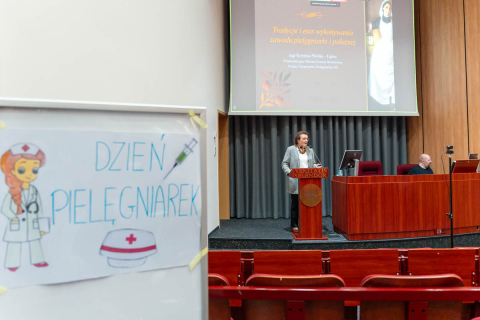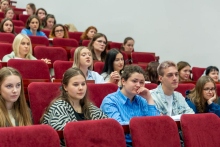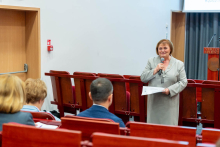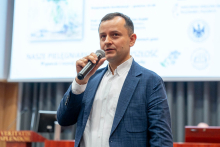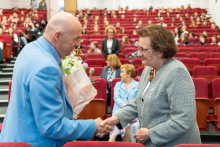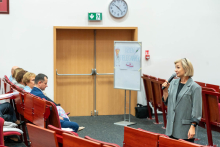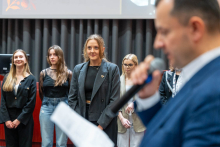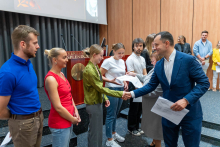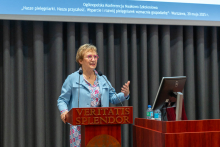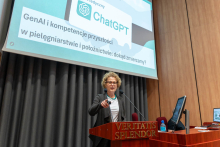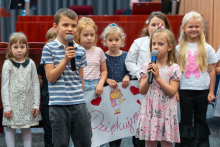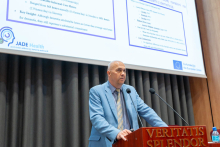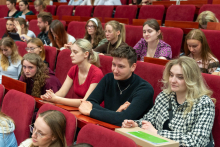“I would like to thank everyone for organizing this event, which brings together the nursing and student communities at our university,” said Dr. Łukasz Czyżewski, Vice-Dean for Nursing, Faculty of Health Sciences.
He emphasized that nursing is a profession of great responsibility, and increased autonomy and extended competences are associated with specific challenges, as well as potential risks.
“A medical profession is not only about prestige and recognition – it also involves daily decisions that can have serious consequences,” explained Vice-Dean Czyżewski.
Conference Program
The conference is both a scientific and training event. This year’s program included two plenary sessions featuring a total of eleven lectures. Conference Program as a PDF file
In addition to plenary sessions, there were separate oral and poster sessions for researchers and students alike. These sessions showcased the wide-ranging interests of both professional nurses and students pursuing nursing studies. Complete list of all presentations as a PDF file
The Tradition and Ethos of the Nursing and Midwifery Professions
“Florence Nightingale said that nursing is the finest of the fine arts—and that is indeed true,” said Krystyna Wolska-Lipiec, Chair of the Historical Committee of the Main Board of the Polish Nursing Association, during the opening lecture.
Nursing has long been recognized as a mission or calling, requiring unique predispositions and a passion for carrying out exceptional and often demanding tasks.
“These are tasks we fulfill in response to societal needs—because society expects this of us, and those expectations are high,” she said, highlighting that nursing requires not only knowledge but also the highest ethical and moral standards. Attributes such as empathy, respect, and humanism are equally essential. Quoting Florence Nightingale again, she emphasized that only good people are fit for nursing.
Nightingale’s legacy was referenced for good reason. The speaker pointed out that nursing relies on strong role models—both historical, like Florence Nightingale, and contemporary, such as academic educators. Their passion and dedication can inspire others to act and grow.
Krystyna Wolska-Lipiec’s commitment to the nursing profession has earned her the Florence Nightingale Medal, awarded by the International Committee of the Red Cross (ICRC) in Geneva. She is the 104th Polish recipient of this honor. On this occasion, she was presented with flowers and congratulations from the Vice-Dean and event organizers.
Caring for Patients Means Caring for Ourselves
Elżbieta Iwanicka, Regional Spokesperson for Professional Accountability at the Warsaw District Chamber of Nurses and Midwives, focused on the legal and ethical dimensions of nursing duties. She also answered questions previously submitted by students concerning professional dilemmas and adverse events—both during academic training and in clinical practice.
She stressed that the patient must always remain at the center of attention within any medical facility. When all healthcare professionals adhere to this principle, many conflicts that otherwise escalate to legal or disciplinary proceedings can be avoided. Knowledge of the law is key, especially since ignorance does not exempt one from responsibility.
“What we absolutely must know and understand includes the content of the acts on the nursing and midwifery professions, the self-government of nurses and midwives, and the Professional Code of Ethics for Nurses and Midwives,” stated Elżbieta Iwanicka. She added that it is also crucial to be familiar with one’s responsibilities and institutional regulations.
She encouraged students who are unsure about fulfilling their duties to consult their clinical mentors or more experienced staff. Awareness of one’s competencies, paired with diligence in learning proper procedures, is essential.
“If you’re unsure whether you can safely perform a task, don’t take it on. Ask for guidance or help. The most important thing is that the patient feels safe,” she emphasized.
Is the Robotization of Nursing a Future Scenario?
An engaging presentation by Aleksandra Mickun, a third-year undergraduate student at MUW, explored the potential use of robots in nursing practice. Her presentation took place during the 15th Jubilee Janina Fetlińska Nursing Olympiad.
“Even if it sounds futuristic, there are many areas in which robots could support our work,” she explained.
She identified six key areas where robots could assist nursing staff: Transport and logistics, e.g., moving lab samples; Physical assistance, such as easing the burden of patient care; Health monitoring, through continuous patient vital signs tracking; Emotional support, especially in geriatric care; Administrative tasks, including documentation; Remote care and telehealth. Among the benefits of robotization, she listed: time savings, reduced physical workload, fewer human errors, more time for direct patient care, and improved safety and hygiene.
“The main advantage of robotization in nursing is improving nurses’ working conditions—which should be the aim of any change in our field. It also raises the professional status of nurses by introducing new competencies,” she said. Robotization could also enhance care quality by optimizing hospital resource management and allowing more time for direct care.
However, she also pointed out disadvantages and risks, such as lack of flexibility and individual patient approach, dehumanization of care, unclear liability for robot errors, unequal access to technology, and societal resistance.
“Robots won’t replace nurses—but they can significantly ease their workload. The key lies in thoughtful planning, training, and staff acceptance. Without all three, robotization cannot be successfully implemented in nursing.
Awards for Participants of the Janina Fetlińska Nursing Olympiad
Certificates and congratulations were awarded to the following participants of the 15th Jubilee Janina Fetlińska Nursing Olympiad: Aleksandra Pabiś, Nina Buczyńska, Anastazja Giętowska, Marta Malinowska, Nikola Klimczak, Aleksandra Mickun, Agata Chudzik, Wiktoria Pawłowska, Marlena Ostas, Alicja Bobrownicka-Lipchen, Wiktoria Katana, Karolina Litwin, Weronika Leszek, Aleksandra Surowiec, Alicja Siemiatycka, Alicja Gliwka, Aleksandra Miłoszewska, Magda Zawalich, Izabela Nasiłowska, Wiktoria Oleszczuk, Mateusz Chołuj, Jakub Foryciarz, Kamil Kalinowski, Ignacy Sakiewicz.
The Performance of “Foxes” and “Mice”
A traditional highlight of the conference was the artistic performance by preschoolers from the Misio Preschool. This year, the children from the “Foxes” and “Mice” groups performed for the attendees.
“Dear Nurse, today is your day. Please accept our smiles and kind words. Defend health like a brave knight. You’re needed all year round. Thank you for your heart. Thank you for your care, for every bandage, kind word, and joyful smile” sang the preschoolers.
Event Organizers
Department of Nursing Development, Social and Medical Sciences, MUW; Department of Clinical Nursing, MUW; Department of Geriatric Nursing, MUW; Department of Surgical and Transplant Nursing, MUW; Department of Nephrological Nursing, MUW; Department of Nursing Propedeutics, MUW; National Council of Nurses and Midwives; Warsaw District Chamber of Nurses and Midwives; Department of Health Economics and Medical Law, MUW; Department of Fundamentals of Nursing, Medical University of Lublin; Clinical Skills Laboratory, Medical University of Lublin; Student Scientific Club of Primary Health Care; Academic Branch of the Polish Nursing Association; Mazovian Branch of the Polish Nursing Association.
The conference took place on May 20 at the MUW Didactic Center. The event was held under the patronage of the Rector of MUW and the Dean of the Faculty of Health Sciences. The conference was hosted by Dr. Zofia Sienkiewicz from the Department of Nursing Development, Social and Medical Sciences, MUW.
